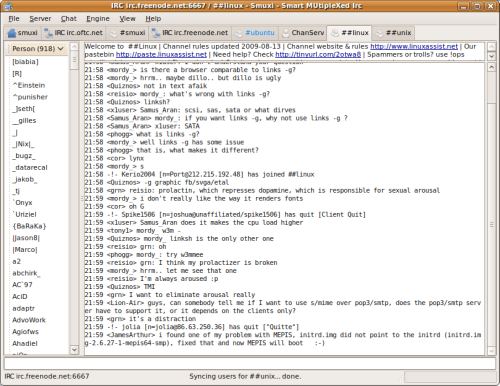Smuxi is an Irssi-inspired, flexible, user-friendly and cross-platform IRC client for sophisticated users, targeting the GNOME desktop. It’s also a client for Twitter, XMPP, Campfire, and JabbR.
The special feature of Smuxi is that it can be used like the typical irssi+screen combo. The IRC session can run on a server (using `smuxi-server’) and a frontend (like `smuxi-frontend-gnome’) then can connect to that. The frontend can then be detached and re-attached at some later point without losing any IRC connections or messages.
Similar to Quassel IRC, it therefore allows users to split the frontend from the backend which manages the actual connections to the IRC servers.
Features include:
-
- Detachable Frontend (frontend can be detached from a smuxi-server).
- Desktop Notifications (with full support of actions, icons, updates, append and sound).
- Messaging Menu / Indicators (as provided by Ubuntu’s Ayatana project).
- Integrated Spell Checking (Linux-only).
- Unified Nickname Colors (identical color across channels and networks).
- Caret-Mode (keyboard navigation through messages).
- Browse Mode (allows to navigate through tabs without moving the markerline).
- Regular and Bash-Style Nickname Completion.
- Full Keyboard Control.
- Message / Command History.
- Configurable Command Character.
- Quick Connect Dialog (simply connect to any server).
- Join Bar (easily connect/join to servers/chats).
- Find Group Chat Dialog.
- Alphabetically sorted chats grouped by network.
- Favicons for Server chats.
- Colors are checked and adjusted for optimum contrast.
- Clickable URLs.
- Word Wrapping.
- Indention of multi-line messages.
- Configurable Highlight Words.
- Markerlines which divide old messages from new messages.
- Toggle-able menubar / status bar.
- Full screen mode.
- Theming Support:
- Configurable Font.
- Foreground / Background Color.
- Chat Activity Colors.
- Configurable Timestamps.
- Configurable Tray-Icon Support.
- IRC:
- Configurable Encoding (ISO-8859-1/15, UTF-8, etc).
- Automatic UTF-8 recode.
- Stripping Colors and/or Formatting from Messages.
- Showing mIRC Colors.
- Splitting oversized messages.
- Channel List / Search.
- CTCP Support including a Menu.
- Invite To Menu.
- Lag Indicator.
- Flood detection and prevention.
- Multi identity support.
- Multiplexed engine.
- Multiple user support.
- Multiple server connections.
- Message patterns.
- Message persistence.
- Counters.
- Also handles Twitter, Facebook Chat, Google Talk, Jabber / XMPP, Campfire and SignalR’s JabbR natively.
- Cross-platform support – runs under Linux, FreeBSD Mac OS X, and Windows. There’s also support for the Raspberry Pi.
Website: smuxi.im
Support: Documentation, FAQ
Developer: Mirco Bauer, Jeffrey Richardson, Giacomo Di Ciocco
License: GNU General Public License v2.0

Smuxi is powered by C# and Mono. The libraries used include SmartIrc4net, Newtonsoft.Json, ServiceStack, Twitterizer, agsXMPP, STFL, GTK#, and many others.
Return to Graphical IRC Clients
| Popular series | |
|---|---|
| The largest compilation of the best free and open source software in the universe. Each article is supplied with a legendary ratings chart helping you to make informed decisions. | |
| Hundreds of in-depth reviews offering our unbiased and expert opinion on software. We offer helpful and impartial information. | |
| The Big List of Active Linux Distros is a large compilation of actively developed Linux distributions. | |
| Replace proprietary software with open source alternatives: Google, Microsoft, Apple, Adobe, IBM, Autodesk, Oracle, Atlassian, Corel, Cisco, Intuit, SAS, Progress, Salesforce, and Citrix | |
| Awesome Free Linux Games Tools showcases a series of tools that making gaming on Linux a more pleasurable experience. This is a new series. | |
| Machine Learning explores practical applications of machine learning and deep learning from a Linux perspective. We've written reviews of more than 40 self-hosted apps. All are free and open source. | |
| New to Linux? Read our Linux for Starters series. We start right at the basics and teach you everything you need to know to get started with Linux. | |
| Alternatives to popular CLI tools showcases essential tools that are modern replacements for core Linux utilities. | |
| Essential Linux system tools focuses on small, indispensable utilities, useful for system administrators as well as regular users. | |
| Linux utilities to maximise your productivity. Small, indispensable tools, useful for anyone running a Linux machine. | |
| Surveys popular streaming services from a Linux perspective: Amazon Music Unlimited, Myuzi, Spotify, Deezer, Tidal. | |
| Saving Money with Linux looks at how you can reduce your energy bills running Linux. | |
| Home computers became commonplace in the 1980s. Emulate home computers including the Commodore 64, Amiga, Atari ST, ZX81, Amstrad CPC, and ZX Spectrum. | |
| Now and Then examines how promising open source software fared over the years. It can be a bumpy ride. | |
| Linux at Home looks at a range of home activities where Linux can play its part, making the most of our time at home, keeping active and engaged. | |
| Linux Candy reveals the lighter side of Linux. Have some fun and escape from the daily drudgery. | |
| Getting Started with Docker helps you master Docker, a set of platform as a service products that delivers software in packages called containers. | |
| Best Free Android Apps. We showcase free Android apps that are definitely worth downloading. There's a strict eligibility criteria for inclusion in this series. | |
| These best free books accelerate your learning of every programming language. Learn a new language today! | |
| These free tutorials offer the perfect tonic to our free programming books series. | |
| Linux Around The World showcases usergroups that are relevant to Linux enthusiasts. Great ways to meet up with fellow enthusiasts. | |
| Stars and Stripes is an occasional series looking at the impact of Linux in the USA. | |